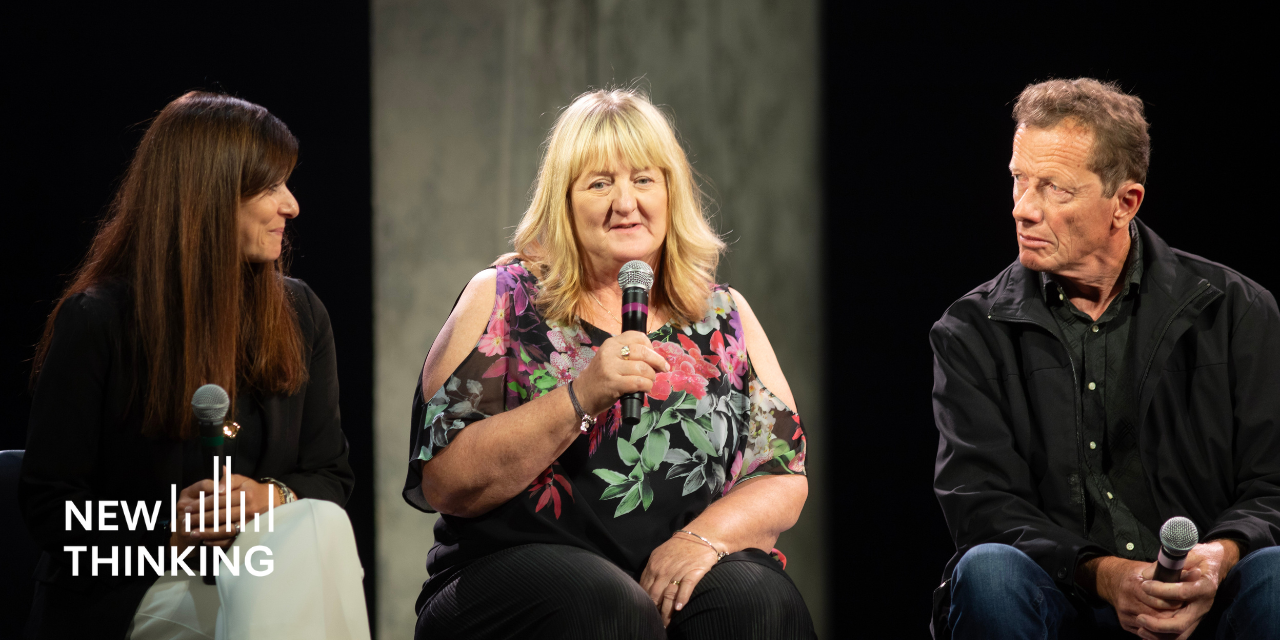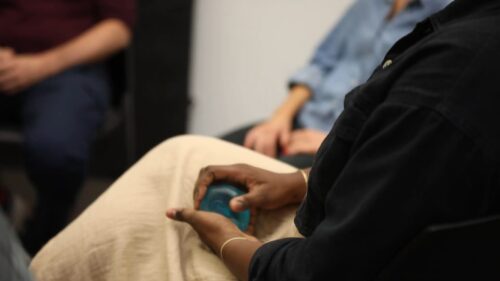Secretary of Justice Penny Armytage discusses the successes and challenges of the recently opened Collingwood Neighborhood Justice Centre.
The following is a transcript:
ROBERT V. WOLF: Hi. My name’s Rob Wolf, and I’m director of communications at the Center for Court Innovation. With me today is Penny Armytage, secretary of the Department of Justice in the state of Victoria in Australia. First off, welcome to New York.
PENNY ARMYTAGE: Thank you very much.
WOLF: How did you come to be secretary of the Department?
ARMYTAGE: My background is actually in human services so I, for a long time, ran our state’s child protection and our homecare services and things like adoption, international adoption and homelessness services. And so quite a few years ago I was approached by the government to become the corrections services commissioner so to run our prisons and community corrections and parole services in Victoria. And I did that for a number of years and then I went back to Human Services, to run one of the regional operations for a period and then not long after that I went to head up the department. And so I’ve been doing that for nearly five years now, being the secretary of the department. But what surprises most people is I’m actually not a lawyer. I’m a social worker in terms of my formal background.
WOLF: That is interesting, and has that informed your work in the Department of Justice?
ARMYTAGE: What has been very helpful is coming from a human services perspective into a justice perspective, and you see the interface between so many of the users of your services is the same, so people with substance abuse problems, mental health problems, intellectual disabilities, socially disadvantaged children and families, are the same cohorts that we work with in many of our human services system as we do in the justice system. And increasingly we are recognizing that to achieve outcomes in justice, we have to work in partnership with our colleagues in human services.
WOLF: In Victoria you’ve developed what I think is the first community court in Australia, and that’s the Neighbourhood Justice Centre, and I think it combines some of the elements that you have just mentioned. And so I thought maybe you could tell me a little bit about how it came to be and how it differs from the centralized court, and I think you’re familiar with one of our projects, the Red Hook Community Justice Center, so maybe you could frame it in terms of how maybe you’re doing things differently there.
ARMYTAGE: Okay, but I mean the fact that our neighborhood justice center came about directly as a result of some of the observations and learning that we had in our contact with the Center for Court Innovation, so our Attorney General, whose been the attorney our state now for quite a long period of time was very keen for us to look at how we could do things differently within our justice system and where we could improve outcomes. And he heard about the community justice center concept, and both he and I were lucky enough to come over and visit Red Hook in our early days of thinking. And I guess we went back with a bit of a commitment that this might be a concept that would work in our high crime rates, high density of living areas within the city of Melbourne. And we actually thought, because it was such a new and different concept that we were going to try to introduce into our court system that we would bring over a number of staff from the center here, to help inform, initially, our consultations with our politicians, our members of cabinet, with our legal fraternity and our courts so the heads in the court’s jurisdictions and community members to say how this concept might work. And so we had a series of workshops and as a result of that, we put forward a proposal to introduce legislation and to get the budget to set up a neighborhood justice center in Hollingwood. So we found a facility that we renovated for the court and we’ve set up the program and it started operating in February. We had some very ambitious programs that we wanted to introduce and, both in terms of the selection of the magistrate—in our terms it is very different because we actually took the recommendation from here and we actually had community members involved in the selection of the magistrate.
WOLF: And how does it vary or differ from the centralized court? What are your goals and methods?
ARMYTAGE: Well, the first thing is that it’s got one magistrate, so it’s a multi-jurisdictional approach and so he hears a diversity of matters that would otherwise take place in three or four different jurisdictions in our system. And so that multi-jurisdictional court, where you can bring together a range of matters that relate to one individual or family, and is very important to the concept of what we wanted behind that Neighbourhood Justice Centre. But so, too, is the fact that we had many other services located in the court. So we have the police prosecutors there, the defense lawyers, but we also have a lot of support services. So we have our aboriginal justice worker is part of our indigenous strategy to address underrepresentation of our current population within the justice system. We have our aboriginal worker there. We have our victim support agency, we have drug and alcohol, homelessness services, and we also have piloted something like a mediation service to try different ways of resolving community disputes and personal family disputes. Principles of restorative justice have become important in the way in which the Centre operates. Things like, we’ve got a graffiti clean-up program and that’s being used by the court to try and have offenders make good quickly for some of the harm and distress they were causing in their community.
WOLF: How would you say things have been going? And are there any challenges that you have encountered that you’re working with?
ARMYTAGE: I’m very pleased with the level of community engagement and support that there has been and how well accepted the concept has been by the police, by the courts, by the defense lawyers, and others in terms of the value it might add. I guess the challenge that we faced is things like balancing the high volume and great need around residential tenancy disputes. So where people are being evicted fairly or unfairly from their accommodation or the public housing, and balancing that with making sure there’s enough space, for example, within the court program to deal with criminal matters, child protection matters, the other things we deal with within that jurisdiction.
WOLF: So you mentioned the Koori population, and I know that in Victoria you have an interesting homegrown problem-solving court called Koori courts. I thought maybe you could explain, you know, what they are.
ARMYTAGE: They are a great concept and it’s worked on the level that we want for us. It started—we had initially one Koori court in Shepparton, which is a county in Victoria, which has a high number of indigenous people. And indigenous people within our system are—they are significantly overrepresented, about 12 times more than non-indigenous people within prison populations, for example, and across all areas in the criminal justice system. And so we decided we had to do something different about that, and the concept that was used with problem-solving court approach, but capitalizing on respect and that is accorded always within the Koori community. So sitting alongside a judge and magistrate in each of our Koori courts is community elders and they have a very significant influence in terms of how the matter is presented. There’s a level of informality, but it makes sure that it’s hopefully relevant. And in some ways, Koori people have regard for and respect for their elders that will emphasize the commitment that they made to the undertakings they give to the court or how they conduct themselves. And extended family members and others participate in that and they are not intimidated as they were in the past. And so successful was our first court that we are now rolling out a series of those courts across Victoria.
WOLF: And let me just ask you what brings you to New York.
ARMYTAGE: We’re hoping to get some new insights to take a few ideas where we can think about the implementation in Victoria and be as successful as we were with the Neighbourhood Justice Centre and come up with another concept that we can implement in partnership with the Centre. Because in establishing a neighborhood justice center, it was fantastic having, just connections between the center here in Red Hook and later with Manchester in the U.K., and having a dialogue and a relationship established where we can learn from each other, share our ideas. And the Center has been the key in it, so we’re hoping that you can share some more wisdom with us.
WOLF: That’s great, so you’re going to go see, I assume, the Brooklyn Mental Health Court.
ARMYTAGE: Yes, we’re on our way there now.
WOLF: That’s great. Well, have a great visit. I hope it’s very productive. I’ve very much enjoyed speaking with you, and thank you very much.
ARMYTAGE: Likewise. Thanks very much.
WOLF: I’m Rob Wolf, director of communications at the Center for Court Innovation. You can learn more about the Center for Court Innovation at our website, www.courtinnovation.org. Thanks.

